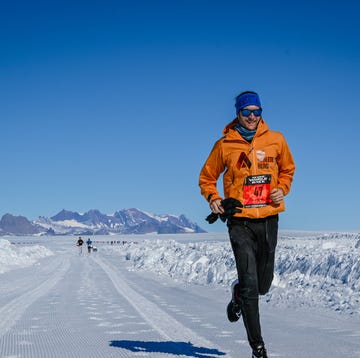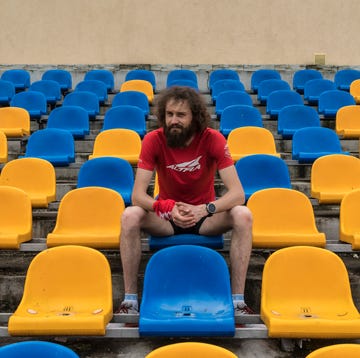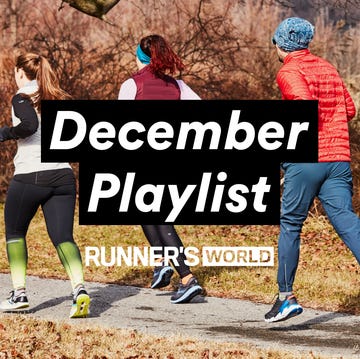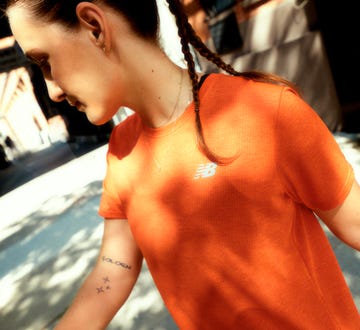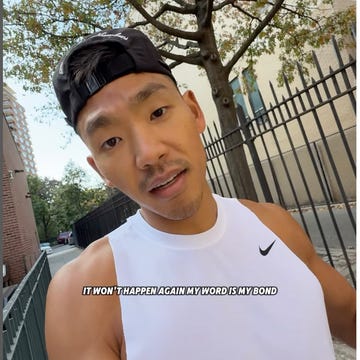Hows your body holding up?
In seventh grade, there was a track meet. PE was my favorite class. I remember entering all these races. I ran the 100 and the 220, the relay, and I won everything. I was like, “Oh, I’m good at this.” From seventh grade on I ran and played basketball and tennis. I was just a total sports fanatic. There was no sport I didn’t want to be involved in, but I just happened to be a halfway decent runner.
I remember when things changed in ninth grade—that’s when I realized I’m not going to win everything. I had a string there where I was completely undefeated, maybe had just lost a couple of relay races. But we moved a lot because my dad was in the military. In Niceville, Florida, there was this girl Donna who was the fastest girl in that part of Florida, and she dusted me in the 100. She blew me out. It was just embarrassing. My confidence was shattered. That was a real eye-opener, and I realized I had to take it seriously and work out a lot and not just rely on what I thought was just my natural talent. I could not run 100 meters after that to save my life.
To run in college I realized I was going to have to move up to the 400 and mile relay to be competitive. It was awful. The 400 is a rough race. To train for that, we ran so many 800 meters that you dreaded that two hours a day in college [Florida A&M University] when you train, because you knew it was going to be painful.
We were also required to run cross-country, and I was like, “Why do we have to do this?” You got it in the end, but here comes the 4 a.m. cross-country team. Training was a full-time job, but it paid off.
What is your current running goal?
I don’t know what year it was, but I ran a 50 flat in the 400, and at that time that was my biggest accomplishment. Then I made All-American. I made it as an individual and then in the 4x4.
I’m fuzzy on when and where—for me it’s a blur, moving around in the military and my job. But later in my life, being inducted into Florida A&M’s Sports Hall of Fame was a huge achievement.
You were a star in the 400 meters, and you nearly qualified for the Olympic track team—were you torn about pursuing those talents for a career in sports journalism?
In 1984, I had the time to qualify. But just barely. And at that point it was either go work at a public-relations station for 20 hours a week or try to go to the Olympic Trials. But a million people had that baseline time. It wasn’t even a desire of mine at that time. My dream wasn’t to go to the Olympics; I just wanted to be solid and represent my school and myself well. But at that time I was focused on getting a job and entering the real world. Track just wasn’t that important to me anymore. I was able to work while I was still in school at that public-relations station: WFSU. So it was a choice: Do I go into the real world, or do I do this other thing that really isn’t that important to me? And there really wasn’t a decision to be made. I had to get going and get ahead of the millions of people who were coming out of journalism and communications schools.
So I did the 20 hours a week and made up the rest by working at the JC Penney cosmetic counter. And at that point, I had no interest in training anymore.
Running Shoes - Gear?
I just admired Wilma Rudolph in track, Althea Gibson in tennis, Arthur Ashe, Jethro Pugh with the Cowboys. My mother was a sick Cowboys fan, and I grew up in Dallas. I just knew I was going to marry wide receiver Drew Pearson.
Then it became news people: Carole Simpson was one of my favorites. Iola Johnson was like Diana Ross in Dallas. I’d run home to see her on the six o’clock news. She was so glamorous, and she gets to be where the action is and bring us the news. Walter Cronkite and David Brinkley. Lynne Sherr was one of the first wave of women in the news. Max Robinson was the first black male. But I saw Carole Simpson, and I felt anything was possible.
What is your current running goal?
My goal is to run the Little Rock Half-Marathon before my 50th birthday. I want to usher in the next half of my life in a grand way, and I want to be superfit and lean, which has gotten away from me. Those are my goals, and I hope my body lets me do that.
It’s important to me. Turning 50 doesn’t terrify me, but I want to set myself up with a big goal. So I’m really determined to do this.
NYC Marathoner Ran Home After Chemo?
It would mean to me that I’ve been able to meet a nonwork goal. My goals are always work-related. It would be so great to have this thing that’s a dream. I knew when I turned 50, I didn’t want to go to Cancun or Turks and Caicos. I wanted to be able to have this thing—have my family there, people who love me. My family will be there to root me on. They were asking, “Why not run in Hawaii?”
What’s it like working with RW’s Bart Yasso to get ready for the race?
Bart is great! He makes you feel like everything’s going to be okay and you can do this. I have a million questions but have refrained from bombarding the poor man. Besides, Runner’s World magazine let’s you search for everything you need to know. Plug. Plug.
With all the travel and constant study you have to do for your job, how are you able to keep up running, and where do your run when you’re on the road?
My inspiration is [Fox NFL analyst and Hall of Fame quarterback] Troy Aikman. He ran a half-marathon [in 1:49:45] last year. Every Saturday he’d train by doing seven to nine miles.
During football season I’m on the road three or four days a week solid—Thursday, Friday, Saturday, Sunday. The days that are really out of the question are featured shooting days and Sundays. Sundays I’m walking around enough that my legs would be too tired. I decided Mondays and Tuesdays are nonnegotiable as the running goes. Those are really just my research days, so I’m able to really block out that time for running. Thursdays, it depends on my schedule—this week my feature is being blocked out on Wednesday, so I’ll be up at 3 a.m., so that’s out. So Thursday will be another run day. Friday, I’ll travel to Minneapolis, so once we’re done and before we go to dinner, I might do a shorter run or some kind of cross-training.
Running Supports This Marathoners Sobriety?
I work with some fast runners, and they’ll say, “Lets go for a run.” It would be easy to say no when they invite me to run because I don’t want to be left in the dust. Even when we run on Saturdays, I put myself way down on the end. They are all men—I’m the only woman. I’m the only woman at dinner, the only woman on my crew, so it’d be nice to have someone join me on those endeavors, but oh well. I just have to understand that I’m just starting, but the competitive person in me wants to be able to keep up. So I do my best. I am finding I’m able to make decent jumps in distance. Still, there are days when I’m running and I wonder, We may earn commission from links on this page, but we only recommend products we back?
I have some guys on the crew that I run with on Fridays and Saturdays. One guy is a cyclist, and my buddy, Willie, is a walk/runner. He’s got to be on the road or off to the trucks by 6:30, so by 5:00 we meet pretty religiously. We’re both trying to drop some pounds, so we push each other, particularly on that day. Those days our production meetings are typically around 9, and I’ve been known to go back to bed, but then I’m just groggy all day, so I’m trying to stick to my 5 a.m. wake up. Anybody who knows me knows I worship my sleep.
But if I’m going to do this, I have to figure it out. I read a lot of Runner’s World, and I saw the story on Jill Biden, and the reader who commented that she has to do like the rest of us and get up an hour earlier. So that’s what I’ll be doing.
Describe your typical run: How far do you go, and are you concerned with pace? Do you run on roads, trails, or treadmills? Mornings or evenings?
For the last month solid, it’s been four times a week for three to four miles. When I move up, I’ve been able to add another mile. Before I started training for this race, I never attempted any kind of distance. I’ve always hated distance. But I set this goal, and Troy was really inspirational, just watching him. On Saturdays he’d run nine miles. Lately we’ve been going outside the hotel gym and finding a gym with good equipment. I’m running my little pitiful 3.5 miles on the treadmill, and he’d run seven. And he’s booking, and I’m kind of crawling along, but I’m just going to do this and not be prideful about it. I’m not going to worry about what my speed or incline is; I’m just going to get to that number. If Troy can finish a half, I can do it.
A Pro Athlete Takes on The Great World Race?
I listen to music on the long runs, but on the other days I listen to guides. I do Runervals Cheetah Fast: Its marathon runners guiding you through sprint work, incline work (intervals). It’s not a distance thing, it’s really just intervals. The other one is Treadmill Challengers, where you’re doing a minute at one percent over your training pace. Then it goes up, all the way to 10. You really see progress rather than getting on the treadmill and kind of meandering.
On the long days, I want to run for an hour. I try not to look at miles; I just want to run for an hour. That’s when I listen to music: hip-hop, pop. I like The Roots. I start with “Here I Come.” Then it’s a Van Halen song, “You Really Got Me,” then I’m rolling.
Did you have a running hero growing up?
Running Shoes - Gear.
Are you currently working off a training plan?
I always thought training plans were so daunting, and now I’m embarking on my own 12-week training plan. My goal is to get up to running at least five days a week, and that will probably include Sunday.
How much are you typically running now?
Right now I’m running pretty much as instructed. I keep wondering if rest days are really necessary. But then lactic acid sets in and I get it. I can’t compare myself to what I think real runners are doing or what I assume they’re doing. My current plan has me building up to 12 miles in 12 weeks.
How much are you typically running now?
I haven’t hit the pavement yet because that sets me back with my back, hip, and knees. So my best option right now is the treadmill. I want to get a foundation before I hit the road. But outdoor running is coming this week. Atlanta has a huge running community, so I might just start following them! It’s a popular running town. Piedmont Park is overflowing with runners, so I’ve actually thought about joining a running club.
How’s your body holding up?
At the risk of sounding like a wimp, I’m having some issues. I was in the doctor’s office last week to deal with back and hip pain, the bane of my existence. I’m supposed to have an MRI to see exactly what’s up with it this time, but I’ve conveniently forgotten to return the call to schedule it because I really don’t want to know. I have a couple of small tears between two discs, but have known about that for about five years. I’m headed back to a few sessions of physical therapy and expect to be as good as new.
In my track days, I had some shredding going on: I had to get my knees smoothed out in both kneecaps and I had some herniations in my back. And I found running really impacted those things. I always knew there was the elliptical, but for me it doesn’t feel like you’re running, it doesn’t have that rhythm that comes with running.
Published: Jan 19, 2011 12:00 AM EST?
Two years ago at the Redskins training camp, I took a step, and my back just locked up. I couldn’t straighten myself up, so the trainers got me upright with some ice and a stim pack. I conveniently forgot to return it. There’s some structural problems with some herniations. There’s no way I’m having back surgery. It comes in spurts, but I can go for months without trouble. My hips have joined the fun. I just need to do some physical therapy, and I do DAA Industry Opt Out, Im a Runner: Pam Oliver.
But those are things you just have to fight through, and I’ll just make sure to do the physical therapy and massage. People have all sorts of problems, so I’ll just have to suck it up. I’ll employ a lot of things I see the players do—deep-tissue massage and that kind of thing.
Who has the fastest raw speed when you see him streaking across a football field right now?
Have you seen Michael Vick look like everybody else is running in quick sand? I see people with more quickness. The people who are supposed to be fast to me are usually just bigger people. Dez Bryant is fast. He can make some people look foolish. Felix Jones. A guy in football doesn’t have to have blazing speed. Guys back in the day like Renaldo Nehemiah, it just didn’t translate. Joey Galloway—Troy said he couldn’t out-throw him because of his speed. But in football it’s more their strength and agility.
Do you think you’ll finish your half-marathon faster than Troy did?
Troy’s a freak. I know for a fact I won’t finish faster than he did. He’s so tired of me and my questions about his program. I constantly ask “Did you run for distance, time, or both?” “How far are you going to go today, Troy?” He usually says, “Seven or eight.” I say, “Oh, great.” Then I take the farthest treadmill away.
I have to ask you—what was it like when the lights went out in the Meadowlands [November 14 during the Giants/Cowboys game] for seven minutes, and how did you, as a reporter, get to the bottom of what was going on in pitch black?
When I say it was dark—it wasn’t dark with a little glow somewhere—it was pitch black. And it was scary. My runner, who is 18, she just grabbed onto me, and I grabbed onto her. You were afraid to move one way or the other because you weren’t sure where you were going. Players were right in front of us, and you don’t know what to think. First your mind kind of goes there, and you’re thinking Running From Substance Abuse Toward Recovery? But they came on soon enough to where we were able to get our senses back, but I have never in my 20-plus-year career experienced anything like that.
Getting the story about what was happening took so long because officials were busy and they were huddled up and radios were blaring as they themselves were trying to figure out what was going on. We had to be patient and wait for the specific information from the Giants’ PR team because that was not one of those situations where you can report what you can see. We were off the air for 12 minutes. So I didn’t know if we were coming back on or if they were canceling the game. I didn’t know all those touchdowns were going on, then I saw the score, and I was like, “When did this happen?” I got in my news mode—find out what you can find out. There was a lot of stuff I was hearing on radio about the escalators being shut down and barricaded, but you just had to wait to find out what was really going on.
It turned out to be that the number-one power line to the stadium blew out. The second one kicked in, but it was too much, so that one blew. The first power outage was the lights around the stadium went out, but then the second feeder kicked out, and that’s when it went totally black.
When I say I didn’t know what to do—it was just freeze. That was your first instinct. But it was actually kind of fun in a weird way.
Would you classify that as one of your most memorable or bizarre experiences as a sideline reporter for the NFL?
It was the absolute most bizarre—there’s not even any competition. I’ve had to dodge Gatorade cups and fans spitting, but I’ve never been in a situation like that. That’s something you’ll never forget. Because everyone was asking me, “Where were you when the lights went out?” But then you just turn back into game mode after a certain point.
Who has the fastest raw speed when you see him streaking across a football field right now?
I have been at Fox for 17 years, and the rest of my career was in news. I went the long way, you could say. I started covering agriculture. I didn’t know what I was doing—I didn’t know a peanut grew in the ground. It was so overwhelming, but it was the best thing that ever happened to me. You had to do everything—covering murder trials, gubernatorial campaigns, and covering agriculture. It was overwhelming. But you just dive in. It was a dream, and I wasn’t going to let anything stand in the way, especially not me.
Can you talk about the role of women in such a male-dominated field of sports journalism and how it’s evolved over the years, in your view?
I get a lot of young women saying, “I’ve admired you my whole life.” I’m the sideline grandma. But it’s like any field that’s male-dominated. I never approached it like I’m going to succeed because I’m a woman or I have to succeed because I’m a black woman. All I wanted to do was succeed. I just wanted to be good and understand the game and focus in on the individuals in the game and the interview process. I broke it down into very specific things—the interview process, the ability to be live, and the writing aspect. I didn’t put extra pressure on myself because when I wake up I’m a woman, when I wake up I’m a black female, so you can’t let that be a burden. You have to approach this as a job and realize people are going to have their opinions about whether a woman should be doing this or that. That’s how I always went at it. I was never in a position where I felt like I had to succeed because I was a woman. I just didn’t let myself go there.
But do you notice a difference in the way you’re received either by execs in the NFL or by players as far as trusting your knowledge?
Nobody really questions me from that standpoint. I don’t try to be an expert in terms of complicated defenses, for example, because it’s not my place, and I will never know more than a coach, so I don’t try to impress them. I understand the game enough to where if they are talking about getting pressure on a quarterback, for example, I can visualize that. I just learned the term “single-high safety,” for example, which is just a safety in the back of the defensive backfield. I’m not afraid to ask questions. If someone is constantly talking about using a single-high safety, then I get to the point where I can visualize it. I don’t use that terminology, but I want to be able to visualize what they are saying. You don’t need to try to show that you know more than the coach when it’s just not the case.
Everything is situational in football. There is not one particular offensive formation or defensive formation. There are tons. There are X’s and O’s that I will never know compared to these coaches. I’m really fortunate to work with Troy Aikman, because he’s a Hall of Famer, a football legend, and he helps me. I’ll look at something and say, “What does that mean?” and I’m 17 years in. I know football, but I’m not an expert the way people around me are. And I don’t try to impress them with complicated schemes or anything like that.
What about in terms of image? How do you become a mainstay in such a cutthroat business and maintain your stature and appeal, and is running a part of that?
My image has been that I’m professional, I know what I’m talking about, and I have great relationships with players and coaches. That just comes from doing it for a very long time.
I’m doing a story on Josh Freeman, whom I don’t know. He’s a very young player. That’s a situation where you learn about him as the cameras are rolling. I expect to develop a relationship with him that won’t be as deep as someone I’ve know as long as Brett Favre. I’ve known him for 17 years. Your image is what you try to make it be without coming out and saying, “This is what I want my image to be.” I don’t want the image of trying to be some sexpot or trying to be Miss Football Expert. I just want to be a reporter.



